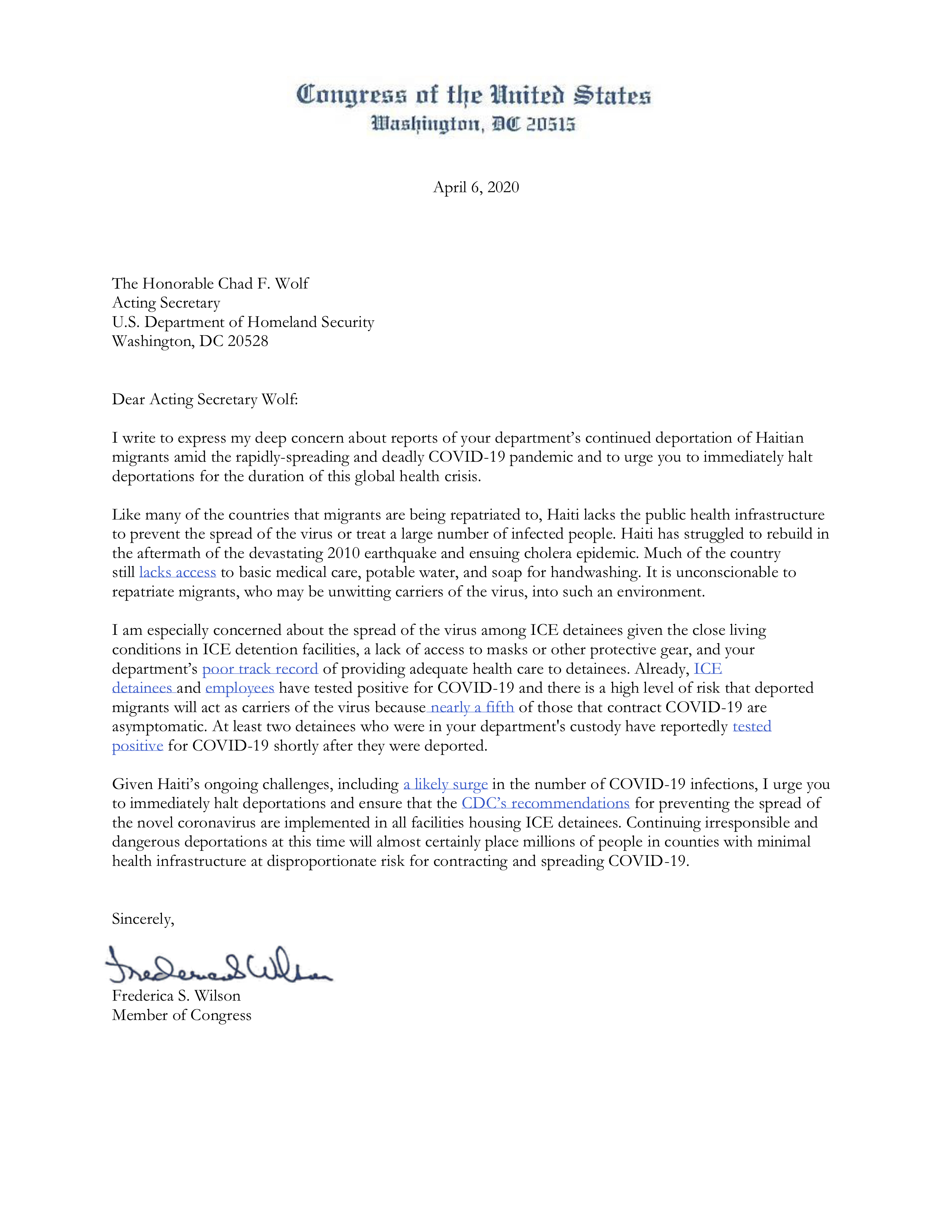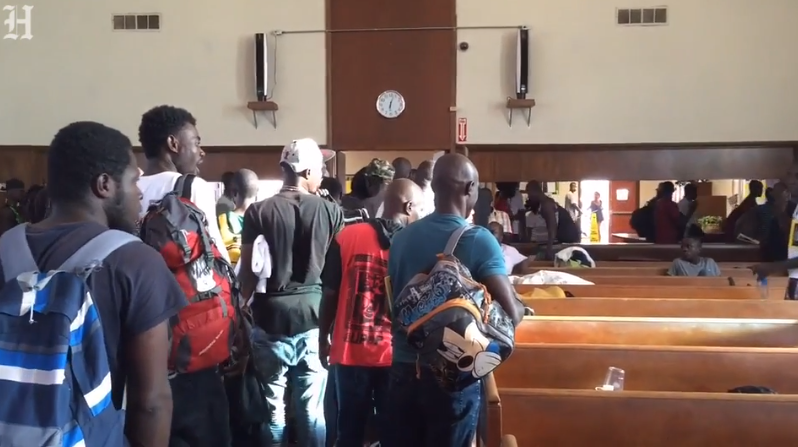
Miami Herald
Some U.S. lawmakers and immigration advocates are expressing outrage at U.S. Immigration and Customs Enforcement’s decision to continue deportations to Haiti in the midst of the accelerating COVID-19 global pandemic, saying the decision “‘presents an unacceptable public health risk to both deportees on board and the citizens of Haiti.”
“This is so wrong,” Rep. Andy Levin, a Michigan Democrat tweeted. He noted that the State Department’s own Level 4 travel warning for Haiti, issued weeks before the global one, warned, “Emergency response, including ambulance service, is limited or non-existent.” If this leads to more cases, #Haiti isn’t prepared to respond & our whole region remains at risk.”
Immigration lawyers and advocates say at least 14 Haitian nationals are scheduled to board a deportation flight from Alexandria, Louisiana, to Port-au-Prince Tuesday. Among the passengers is a detainee who had been exposed to the coronavirus while in immigration lockup at two different facilities.
The time of the flight was unknown, and late Monday members of Congress were mobilizing to try and halt it after being contacted by lawyers and prominent health and human rights groups working in Haiti, including Partners In Health and the Institute for Justice and Democracy in Haiti. Some were making phone calls to immigration officials in the Trump administration, while others were firing off letters to both the Department of Homeland Security and the White House.
Congressional aides told immigration advocates that although Haiti has stopped commercial flights, Tuesday’s flight is a chartered plane using appropriated funds and is therefore still allowed under Haiti’s moratorium on inbound flights. Moreover, it is their understanding that Haitian President Jovenel Moïse authorized the deportation flight.
Attorney Ira Alkalay, who represents the detainee, whom the Miami Herald has agreed not to name, said his client was exposed to COVID-19 while in at least two detention centers — Bristol County Jail in Massachusetts, where a staffer tested positive, and at Strafford County Jail in New Hampshire, where a deputy has tested positive for the virus.
“When my client was brought from Bristol to Strafford, he was brought along with a detainee who was sick and feverish and who ultimately disappeared at some point after being seen by medical staff,” Alkalay said.
The Miami Herald reviewed the Haitian national’s documents, which showed the deportee was at both facilities before being transferred to the Alexandra Staging Facility in Louisiana– a center where people are held for up to 72 hours before entering or leaving the country.
“Do the math. How many places and people has my client been around since being exposed to the virus? He has told me that they are all in a room together; that there is no social distancing whatsoever,” he said. “Just think about what will be dropped on Haiti’s doorstep when possibly infected people get off that plane.”
Despite the concerns, and repeated pleas by Haiti’s new foreign minister, Claude Joseph, to U.S. officials to suspend the deportation flights amid the coronavirus pandemic “so we can get ready to accept them,” the Trump administration insisted on moving ahead with the flight, advocates said.
“I have many times over the phone tried to convince our American friends,” Joseph said.
A spokesperson for the U.S. State Department would not address Joseph’s request, saying they cannot comment on diplomatic discussions.
“Under international law, countries have a duty to take back their citizens, and we appreciate the close partnership the United States shares with Haiti in this and many other areas,” the spokesperson said.
Immigration advocates say the deportation flights carry huge risks for Haiti, which registered its first coronavirus-related death over the weekend and has 24 confirmed cases as of Monday.
“Should they finally come, by our side, the government, [Ministry of Public Health and Population] in particular, will do its utmost to screen and quarantine them,” Joseph said.
That is a tall order for a country where only 257 people have been tested so far for the virus and the health ministry on Monday confirmed there was now community transmission, which means there are cases that have no connection to travel or a known infected person.
“There is nothing humanitarian in what’s being done here,” said Pierre Esperance, executive director of the National Human Rights Defense Network.
A human rights defender, Esperance noted that Haiti lacks ventilators, adequate intensive care units and personal protection equipment for healthcare workers. In a letter sent to the chief of missions at the country’s embassies around the world, Joseph recently asked diplomats for help in securing masks, ventilators, gloves and other medical gear and equipment to fight the respiratory disease.
Esperance pointed out the irony of the U.S.’s deportation push. At the same time that it is seeking to deport Haitians — who under local law can end up in detention upon arrival based on their crimes in the U.S. — the U.S. government is also encouraging the release of some prisoners from Haiti’s overcrowded jail cells to limit the spread of COVID-19 inside prisons.
Since the outbreak, the United Nations and the Pan American Health Organization have both expressed concerns about Haiti’s ability to manage the global pandemic, given its weak healthcare system.
Currently, only the National Laboratory can test for the coronavirus, and there is no structure large enough to quarantine a massive number of people.
“Their healthcare system was compromised even before this so if we get just 25 cases, we can imagine what will happen,” said U.S. Congresswoman Frederica Wilson, D-Miami, whose office sent a letter to both the Trump administration and DHS asking for a stop to the deportation.
Wilson pointed out that on top of the pandemic, Haiti is already facing a situation in which its president is ruling by decree, the economy is in shambles and it faces a humanitarian crisis, including famine, following last year’s repeated violent protests that forced schools and businesses to cease operations for months .
“They haven’t recovered from all of the rioting, people not being paid and the government being shut down, one man ruling the country. That’s unsustainable,” she said. “We are in a pandemic and we can’t do anything to exacerbate that, especially repatriating people there who we don’t know whether they are positive or not. The safest thing is to shelter in place, and everyone needs to shelter in place.”
Last month, the Guatemalan government suspended all deportation flights from the U.S. after a deportee tested positive for the coronavirus after arriving in the Central American country aboard a chartered U.S. Immigration and Customs Enforcement airplane.
But the measure was only temporary. The flights resumed two days later after the U.S. agreed to put in place health measures.
“I’m deeply concerned about the health and safety of ICE’s practices during this pandemic. COVID-19 is extremely contagious and in spite of reports that people in ICE detention have tested positive for the virus, it is still deporting individuals who may have been exposed to countries without the resources to properly combat this disease,” said U.S. Rep Donna Shalala, D-Miami.
“ICE’s irresponsible practices risk not only jeopardizing the health of the people in custody here in the U.S., but also worsening the crisis abroad,’’ she said. “ICE needs to temporarily halt deportations and take the actions necessary to prevent the rampant spread of this virus.”
Haiti Deportations Letter (FINAL).pdf


